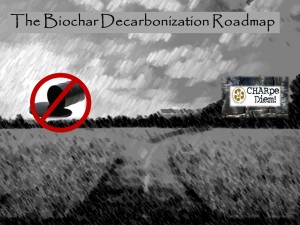I tend to prefer carrots over sticks, not just because they taste better, but because I think as a motivational tool, carrots are more effective. Perhaps this is why the notion of a price on carbon doesn’t really make me (and a lot of others) want to jump up and cheer. Punitive measures seem to do a really excellent job of stirring up the opposition to any sort of regulation and a not-so-excellent job of getting anyone motivated to race down the decarbonization path, which is really what is needed. So when I read this article in Yale’s e360 saying that the key recommendation by leading scientists and economists to decarbonize the global economy is to mandate an increasing price on carbon, I was a bit dismayed (no disrespect, these folks all have IQs in the stratosphere). Where I do agree with the authors is when they describe the need for ‘detailed, realistic decarbonization plans’, a sort of Atkins (low carb) Diet for the planet if you will.
Normally I focus on biochar’s ability to recarbonize the soil, but recently I have come to realize that that is actually what happens at the end of the biochar cascade. Sustainable biochar production could actually be a hugely effective decarbonization path for a number of different industries. [It could even be used at a municipal or college campus level as I’ve mentioned previously.]
Let’s take food processing as a fairly straightforward example of how biochar can help decarbonize an industry. I’ll use the example of a cherry juice producer that landfills tons of cherry pits each week. Here’s how on-site biochar production could not only provide a Carbon detox but perhaps more importantly from a motivational perspective, save them beaucoup bucks!
- Reduced fossil fuel energy – on-site pyrolysis can generate significant amounts of heat which can be turned in to electricity which is needed for the production and refrigeration process. Supplying your own fuel source could translate into huge cost reductions.
- Reduced waste management– paying a waste removal service to transport pits to a landfill is not something companies like doing. As this type of company grows, so does the waste management cost and the GHG emissions related to transportation and methane emissions once this type of waste is landfilled. Who would say no to no tipping fees!
- Increased revenue potential – manufacturers could set up off-take agreements for the biochar produced. Trash to cash – got to love that!
The biochar decarbonization roadmap can be applied to many, many different types of industries from farming to forestry to food processing. Appropriate scale pyrolysis equipment to serve this market is still in its infancy but the landscape is changing fast. Equipment will need to pass strict emissions regulations (rightly so) which may slow down the adaptation of these technologies, but the biochar decarb pathway is being built. This is one bandwagon I predict many industries will eagerly jump on once the economic benefits are quantified!


